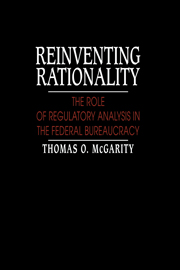Book contents
- Frontmatter
- Contents
- Acknowledgments
- Abbreviations
- Introduction
- Part I The clash of regulatory cultures
- Part II Regulatory analysis in theory and practice
- Part III Structuring regulatory analysis into the decisionmaking process
- 11 Roles for the regulatory analyst
- 12 The hierarchical model
- 13 The outside advisor model
- 14 The team model
- 15 The adversarial model
- 16 A hybrid model
- 17 Selecting the right model
- Part IV Review of regulatory analysis
- Part V Conclusions
- Notes
- Bibliography
- Index
15 - The adversarial model
Published online by Cambridge University Press: 16 October 2009
- Frontmatter
- Contents
- Acknowledgments
- Abbreviations
- Introduction
- Part I The clash of regulatory cultures
- Part II Regulatory analysis in theory and practice
- Part III Structuring regulatory analysis into the decisionmaking process
- 11 Roles for the regulatory analyst
- 12 The hierarchical model
- 13 The outside advisor model
- 14 The team model
- 15 The adversarial model
- 16 A hybrid model
- 17 Selecting the right model
- Part IV Review of regulatory analysis
- Part V Conclusions
- Notes
- Bibliography
- Index
Summary
One response to the inevitable clash between techno-bureaucratic rationality and comprehensive analytical rationality is to capture the rivalry in an adversarial decisionmaking model. Under this model, each office is responsible for assembling its own information and analyses and for critiquing the information and analyses of the other office. Disagreements over facts, assumptions, inferences and policies are aired in an adversarial fashion, either by memoranda or orally, before the ultimate agency decisionmakers. The National Highway Traffic Safety Administration (NHTSA) in The Department of Transportation (DOT) has adopted a fairly pure version of this adversarial model. Two large offices within NHTSA – the Office of Rulemaking and the Office of Plans and Programs – play large roles in the internal rule development process. The agency leadership has made a conscious effort to play the two offices against each other until fairly late stages of the internal decision making process. Once the head of the agency has decided a question, however, all agency employees are expected to fall in line and provide support for the final decision.
The adversarial model in the National Highway Traffic Safety Administration
NHTSA was established in 1966 to establish safety standards for motor vehicles. The agency was later folded into DOT and was given responsibility for reducing the economic costs of automobile accidents and for promoting fuel conservation. The Office of Vehicle Safety Standards does the vast bulk of the agency's rulemaking work. It is made up of twenty-six Rulemaking Program Directors who prepare the Rulemaking Support Papers that provide the technical basis for the rules that the agency promulgates.
- Type
- Chapter
- Information
- Reinventing RationalityThe Role of Regulatory Analysis in the Federal Bureaucracy, pp. 229 - 238Publisher: Cambridge University PressPrint publication year: 1991



